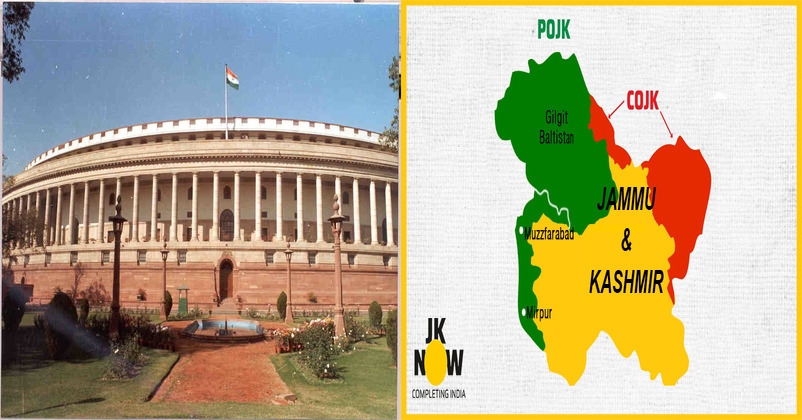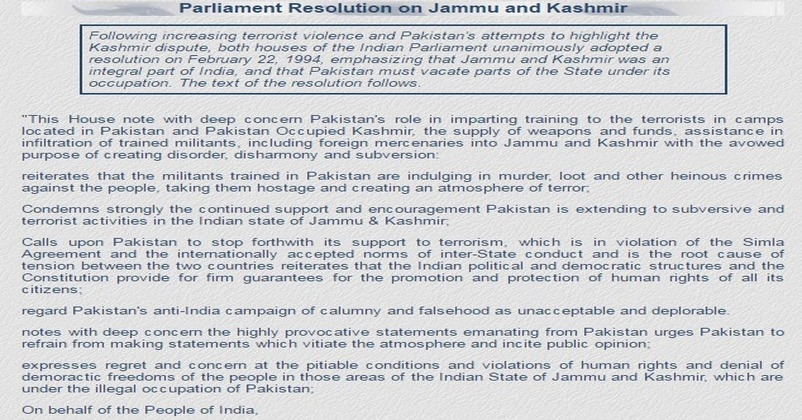Solution to Kashmir is explained in Parliament resolution on Jammu and Kashmir passed 25 Yrs Before today
| 22-Feb-2019 |

Parliament of India and State of J&K
On February 22, 1994, a unanimous resolution was passed by the Indian Parliament. This resolution declared that,
“(a) The State of Jammu & Kashmir has been, is and shall be an integral part of India and any attempts to separate it from the rest of the country will be resisted by all necessary means;
(b) India has the will and capacity to firmly counter all designs against its unity, sovereignty and territorial integrity; and demands that –
(c) Pakistan must vacate the areas of the Indian State of Jammu and Kashmir, which they have occupied through aggression; and resolves that –
(d) all attempts to interfere in the internal affairs of India will be met resolutely.”

Parliament Resolution on Jammu and Kashmir
The parliamentary resolution on Jammu and Kashmir was significant because it was a reiteration of India that the entire state of Jammu and Kashmir belongs to India. It also means that even the areas, which Pakistan has usurped in Jammu and Kashmir, belong to India only. In 1947, Pakistan invaded the state of Jammu and Kashmir before the Instrument of Accession (IoA) would have been signed in favour of India and started killing innocent people, which included men, women, and children. During the bloodbath of 1947 thousands of innocent resident of Jammu and Kashmir were killed mercilessly and lakhs had to flee their homes to safeguard their own life. Though United Nation Commission on India and Pakistan found that Pakistan is an aggressor, usurper, and murderer of innocent people in Jammu and Kashmir yet it did not do anything to vacate the areas and delivering justice to the people of the state.
In 1970 Pakistan divided the areas of Pakistan Occupied Jammu and Kashmir (POJK) into two parts viz. Azad Jammu and Kashmir and Northern Areas. Azad Jammu and Kashmir was a self-governing State under the control of Pakistan with a President, Prime Minister and a Legislative Assembly whereas the Northern Areas that include Gilgit and Baltistan regions have been made an autonomous self-governing body under Pakistan control called Gilgit-Baltistan. Gilgit-Baltistan has a Governor appointed from Islamabad and a Chief Minister. Both the regions are facing enormous hardship and exploitation in the hands of Pakistan. For more than the last six decades, POJK has borne the brunt of sectarian violence, no development of civic infrastructure and amenities, denial of fundamental rights and oppression by Islamabad based polity. Democratic voices are crushed ruthlessly by Pakistan and political rights are denied to the people of this region. Regular Shia-Sunni conflicts are also reported from Gilgit-Baltistan and extreme measures are used against the Shia community. There is a sustained and systematic campaign for disturbing the demographic order of this region by encouraging large scale migration from Khyber-Pakhtunkhwa province. Surprisingly, the gross violation in POJK is never discussed in the national and international arena. Even the UN does not bother to look into the plight of the hapless people from this region.
India has reclaimed its rights over the entire state of Jammu and Kashmir, including POJK, through this resolution. The resolution also highlights the situation of human rights in this region that legally belongs to India. This resolution is a unanimous and firm voice of the nation.